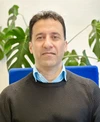"With my PhD work I want to help improving the land and water management in my home country Afghanistan"
July 13, 2015.
ZEF Doctoral student <link http: www.zef.de external-link-new-window external link in new>Fazlullah Akhtar conducts research on water management in his home country Afghanistan. "Data scarcity in Afghanistan is a huge challenge for researchers there", says Fazlullah. "Thanks to ZEF, I had the opportunity to do an internship at <link http: www.icarda.org external link in new>ICARDA in Jordan, to benefit from their research achievements and data and to learn some additional skills". Read what he told us about his experiences.
What did motivate you to do an internship with ICARDA in Jordan during your PhD study at ZEF?
I wanted to work in research organizations that have already made some achievements in the field of agricultural research - especially on management of land and water resources. <link http: www.icarda.org external-link-new-window external link in new>ICARDA (International Center for Agricultural Research in the Dry Area) is such an organization, belonging to the <link http: www.cgiar.org external-link-new-window external link in new>CGIAR system (Consultative Group for International Agricultural Research). I got an opportunity to work as an intern in one of the CGIAR research programs on water and land ecosystems (WLE) entitled“Managing irrigation-drainage systems to sustainably enhance productivity in Fergana Valley, Central Asia“. I worked under supervision of ZEF alumnus Dr. Usman Khalid Awan, who is working with ICARDA as a groundwater hydrologist with the unit <link http: www.icarda.org integrated-water-and-land-management teaser>Integrated Water and Land Management (IWLM). My objectives were 1. to learn modern techniques in the management of water resources in a data-scarce environment and 2. To get acquainted with experienced researchers who are looking at interdisciplinary aspects of water management in dry areas. This internship definitely enhanced my interdisciplinary capacities learned at ZEF. I certainly enjoyed and learned a lot from ICARDA’s dynamic and scientifically resourceful and research-oriented environment.
What projects were you working for and involved in during your internship?
Initially I worked in the WLE project on the Fergana valley in Uzbekistan and developed a framework to manage water resources in a data-scarce environment. I integrated this research into my PhD research on the Kabul river basin. At ICARDA, I learned how to estimate evapotranspiration by using satellite remote sensing (SEBS and SEBAL algorithms), how to map land use and land cover by using phenological parameters derived from MODIS satellite data, how to apply water balance techniques and also how to implement Soil and Water Assessment Tools (SWAT) for simulating demand and supply scenarios. I also attended training in the simulation of climate change scenarios in SWAT. I also had the chance to get familiar with ICARDA’s projects, for example those with farmers on enhancing the land and water productivity in Central and South Asia as well as the Middle East. My research conducted so far at ZEF formed a perfect bridge to ICARDA, since both research institutes are working on interdisciplinary issues of development research. My meeting with Professor Paul Vlek (former ZEF-director and Interim Deputy Director General of Research of ICARDA) was also an asset. His keen interest in my work and his advice were and will be of great use in shaping my doctoral study. In addition to this, I acted as a trainer in a workshop on “Improving Water Productivity in Agricultural Systems” from May 3-21, 2015 arranged by ICARDA in Amman. Participants were professionals from Middle Eastern countries i.e. Tunisia, Iraq, Jordan, Egypt as well as from Sri Lanka and Pakistan. I contributed with a presentation on “Irrigated agriculture in Uzbekistan-a case study”.
So now you are back at ZEF. What are the next steps for your research? Could you tell us something more about it?
Back at ZEF I will utilize my acquired skills in analyzing the data I collected for the Kabul river basin in Afghanistan. More specifically, I will analyze the agricultural water demand versus supply at various temporal and spatial units of the Kabul river basin. Furthermore, a tentative analysis of the land use and land cover of the study area will also be incorporated in my PhD thesis. This added information will contribute a lot to improve the data scarcity about the Kabul river basin. With my PhD work, I also want to help providing a scientific base to the planning and management of the land and water resources of the trans-boundary Kabul river basin.
Mr. Akhtar, thanks for the interview.



